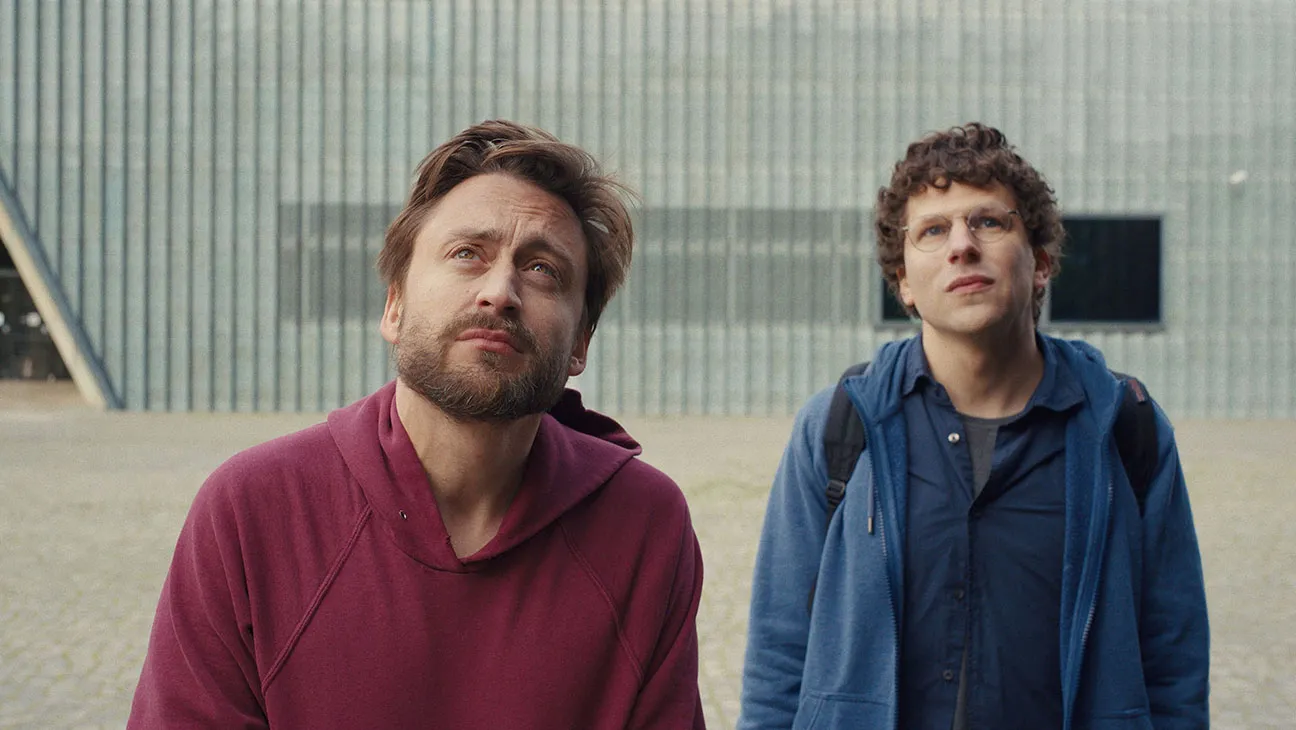A Real Pain – Bolek and Lolek
The title of Jesse Eisenberg’s latest film (his second as director) carries a double meaning: first, it questions what truly constitutes “great pain” or “real pain,” weighed historically, individually, and collectively. The second refers to a real “pain in the ass” – mainly the explosive and uninhibited cousin Benji (Kieran Culkin), who, whether intentionally or not, constantly pushes the anxious David (played by Eisenberg) to the brink of despair. As the two Americans travel for a heritage tour through Poland, where their grandmother, a Holocaust survivor, once lived and fled from, A Real Pain wrestles with a hierarchy of suffering: collective trauma never fades into the background of the protagonists’ personal worries, yet the validity of their own anxieties is a constant source of internal conflict.
Eisenberg’s project isn’t, however, drenched in solemnity and gravitas; instead, it’s a charming indie stew, a daytime comedy with touches of both the buddy and road-movie genres. The tone is largely self-ironic, as Eisenberg plays his character’s small neuroses and OCD-like idiosyncrasies with keen self-awareness, embodying his signature brand of social misfit – this time more human and affable than the nerdy little monster Zuckerberg that made him famous in The Social Network (2010, dir. David Fincher). On the other hand, Culkin plays a sort of mini Roman Roy (see his phenomenal performance in Succession), the same hyper-charismatic yet emotionally stunted 40-year-old man-child who hides behind crass jokes and drifts through life in a haze of joints. If David is the kind of guy who sends 20 texts to update you on his exact location en route to the airport, to his dismay, Benji is the one who wakes up five minutes before departure. This personality clash fuels the film’s comedy, with David’s constant tension colliding against his cousin’s seemingly carefree approach to life.
As the two Americans travel for a heritage tour through Poland, where their grandmother, a Holocaust survivor, once lived and fled from, A Real Pain wrestles with a hierarchy of suffering: collective trauma never fades into the background of the protagonists’ personal worries, yet the validity of their own anxieties is a constant source of internal conflict. Eisenberg’s project isn’t, however, drenched in solemnity and gravitas; instead, it’s a charming indie stew, a daytime comedy with touches of both the buddy and road-movie genres.
On a Holocaust tour, surrounded by cemeteries, camps, and memorials, Benji initially seems like a ticking time bomb – the kind of tone-deaf clown who blurts out whatever crosses his mind and can’t help but crack an inappropriate joke. But the real absurdity lies in the context itself. What Eisenberg satirizes in A Real Pain is the normalized absurdity of all-inclusive packages that turn Holocaust memory into a tourism industry. While the other tour participants are all driven by profound sentiments – among them, an elderly Jewish couple, a woman trying to understand her mother, and a Rwandan genocide survivor who converted to Judaism – the trip itself feels like a checklist of stereotypical and sometimes disrespectful experiences. Rather than a mere provocateur, Benji plays the fool who dares to tell the king the truth; his outbursts are the only ones that challenge the dull, over-academic approach of their English tour guide (Will Shatner). In one comedic yet justified tantrum, Benji complains about the constant barrage of “fun facts” and demands that everyone take a moment of silence to properly absorb the meaning of the cemetery they’re in. The moment is resonant and moving – the American’s protest is touching, but so is the realization that, up until that point, no one had considered such a simple and deeply human gesture.

Benji’s outbursts may be inappropriate and volatile, but they carry essential concerns. In another scene, on a train, he adamantly insists they move to second class because he finds it inappropriate to travel through Poland in first class when their grandparents were transported in the most inhumane conditions during the Nazi occupation. From David’s perspective, the comparison is exaggerated, and Benji’s persistence is almost comedic, but this is precisely where the film articulates its core themes of pain and memory. What Eisenberg ultimately suggests through the blend of humour and awkwardness that permeates the cousins’ journey is that, fundamentally, we don’t know how to talk about pain – ours or anyone else’s. We hesitate, we stumble, we struggle to treat what deserves respect with due reverence, and we censor our humour when it comes to heavy subjects.
Without distracting from or cushioning historical trauma, A Real Pain offers a perspective on Holocaust remembrance – specifically through the lens of third-generation descendants – that neither exploits nor wallows in misery (unlike the all-inclusive tours). Instead, it refocuses on the human realities of both the dead and the living. When they finally arrive at the emotional epicenter of their trip, the Majdanek concentration camp, Eisenberg opts for a simple and respectful approach, letting the space speak for itself. No dialogue, no sound (almost reversing The Zone of Interest‘s technique); we see the pathways and gas chambers in complete silence, with no ornamental or distracting noise. Sound returns only after they leave the place. This absence seems to suggest something even greater – beyond the limitations of representational tools in depicting the Holocaust, there exist traumas and events that our faculties simply cannot help us process.
What Eisenberg ultimately suggests through the blend of humour and awkwardness that permeates the cousins’ journey is that, fundamentally, we don’t know how to talk about pain – ours or anyone else’s. We hesitate, we stumble, we struggle to treat what deserves respect with due reverence, and we censor our humour when it comes to heavy subjects.
Beyond its historical thread and this self-contained moment, A Real Pain also explores the so-called smaller pains that shadow both cousins – not just in their own lives, but also in grappling with their grandmother’s recent death. There’s something deeply familiar in their almost fraternal bond – that bittersweet realization that, despite growing up together and loving each other, time has made them too different to truly understand one another anymore. It’s easy to see how the film secured an Oscar nomination for Best Original Screenplay, especially when Eisenberg’s signature monologue (see also The Double, 2013, dir. Richard Ayoade) confesses with poignant self-awareness: “My pain isn’t exceptional, so I don’t feel the need to burden anyone with it.” Delivered with a deadpan and timid tone, masking decades of insecurity, David weighs his suffering not just against transgenerational trauma but also against his cousin’s. When Eisenberg’s script finally peels back Benji’s bravado, we see a broken man, devastated by the loss of “the most important person in the world” to him. Kieran Culkin earns his Best Supporting Actor nomination here as well; while his character doesn’t stray far from his spoiled child persona in Succession, he masterfully embodies that blend of humour and lightheartedness that so often conceals despair and mental health struggles. Darkness and pain seep into A Real Pain subtly and naturally, much like they do in real life.

Despite such praises and a standout cinematic moment – two Hollywood A-listers crammed into a quintessentially Eastern European minibus – A Real Pain ultimately falls short of being truly memorable. It simply lacks a certain spark. It’s a formidable character study centred on American-Jewish identities and generational dilemmas, yet it retains a clinical air, one of a well-crafted script that feels too much like a script. Just as we start digging beyond the pleasantries and superficialities we use in real life to keep from falling apart, the journey ends, and the two characters return to their realities. Much like David’s reluctance to engage in deep conversations and Benji’s tendency to mask his emotions, the film itself refrains from fully confronting the most painful truths. Perhaps that’s its melancholic charm after all – A Real Pain makes a cynical yet truthful argument about life: in the grand scheme of history, it’s just a succession of small, fleeting, and quietly remarkable moments.
Title
A Real Pain
Director/ Screenwriter
Jesse Eisenberg
Actors
Kieran Culkin, Jesse Eisenberg
Country
SUA
Year
2024
Distributor
Forum Film Romania

Graduated with a BA in film directing and a MA in film studies from UNATC; she's also studied history of art. Also collaborates with the Acoperisul de Sticla film magazine and is a former coordinator of FILM MENU. She's dedicated herself to '60-'70s Japanese cinema and Irish post-punk music bands. Still keeps a picture of Leslie Cheung in her wallet.


